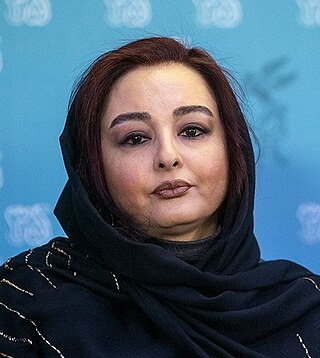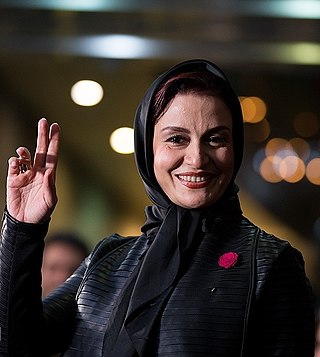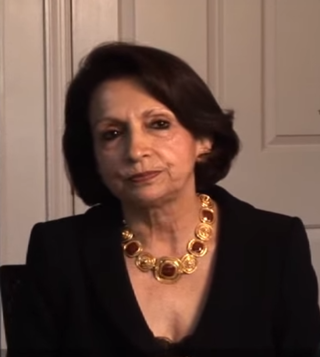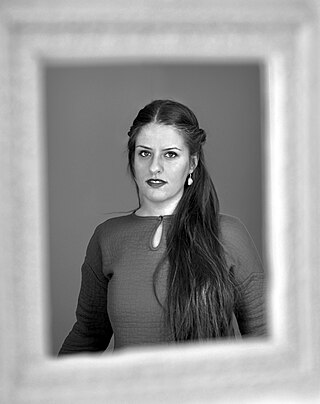
The cinema of Iran, or of Persia, refers to the film industry in Iran. Particularly Iranian art films have garnered international recognition. Iranian films are usually written and spoken in the Persian language.
Throughout history, women in Iran have played numerous roles, and contributed in many ways, to Iranian society. Historically, tradition maintained that women be confined to their homes to manage the household and raise children. During the Pahlavi era, there was a drastic social change towards women's desegregation such as ban of the veil, right to vote, right to education, equal salaries for men and women, and the right to hold public office. Women were active participants in the Islamic Revolution. Iran's constitution, adopted after the Islamic Revolution in 1979, proclaims equality for men and women under Article 20, while mandating legal code adhering to Sharia law. Article 21 of the constitution as well as a few parliament-passed laws give women rights such as being allowed to drive, hold public office, and attend university but not wearing a veil in public can be punished by law; and when in public, all hair and skin except the face and hands must be covered. However, this is often not enforced; notably in recent years, Iranian women have started a number of groups to rebel against the government's oppressive policies and reclaim their independence and rights.

Jafar Panâhi is an Iranian film director, screenwriter, and film editor, commonly associated with the Iranian New Wave film movement. After several years of making short films and working as an assistant director for fellow Iranian filmmaker Abbas Kiarostami, Panahi achieved international recognition with his feature film debut, The White Balloon (1995). The film won the Caméra d'Or at the 1995 Cannes Film Festival, the first major award an Iranian film won at Cannes.

Shirin Neshat is an Iranian visual artist who lives in New York City, known primarily for her work in film, video and photography. Her artwork centers on the contrasts between Islam and the West, femininity and masculinity, public life and private life, antiquity and modernity, and bridging the spaces between these subjects.

Abbas Malekzadeh Milani is an Iranian-American historian, educator, and author. Milani is a visiting professor of political science, and the Hamid and Christina Moghadam Director of the Iranian Studies program at Stanford University. He is also a research fellow and co-director of the Iran Democracy Project at Stanford University's Hoover Institution. In Milani's book, Lost Wisdom: Rethinking Modernity in Iran, he has found evidence that Persian modernism dates back to more than 1,000 years ago.

Mahaya Petrosian is an Iranian actress of Armenian descent. She is also a director, A Beautiful Snowy Day being her first movie as director.

Two Women is a 1999 Iranian drama film written and directed by Tahmineh Milani.

Merila Zarei is an Iranian actress. She is one of the most influential actresses after the Islamic Revolution of Iran, who has appeared in the films of renowned directors such as Asghar Farhadi, Ebrahim Hatami Kia, Pouran Derakhshandeh, Reza Attaran, Abbas Kia Rostami and Masoud Kimiaei.

Seyyed Shahabedin Hosseini Tonekaboni is an Iranian actor, producer, director and screenwriter. He is known for his collaborations with Iranian Academy Award-winning director Asghar Farhadi in About Elly (2009), A Separation (2011), and The Salesman (2016). His accolades include a Cannes Film Festival Award for Best Actor, a Silver Bear for Best Actor, and a Crystal Simorgh for Best Actor.

Mania Akbari is an Iranian filmmaker, artist, writer and actress whose works explore women's rights, marriage, sexual identity, disease and body image. Her style, in contrast to the long tradition of melodrama in Iranian cinema, is rooted in the visual arts and autobiography. Because of the taboo themes frankly discussed in her films and her opposition to censorship, she is considered one of the most controversial filmmakers in Iran. As an actress, she is best known for playing the lead role in Abbas Kiarostami's Ten (2002).

Hamideh Kheirabadi was an Iranian film and theatre actress. She played in more than 200 feature films and in over 20 television series. In Iran, she is affectionately referred to as Nādereh and Mother of the Iranian Cinema.

Farzaneh Milani is an Iranian-born American scholar, author, poet, translator, and educator. Milani teaches Persian literature and women's studies at the University of Virginia; and serves as the Chair of the Department of Middle Eastern and South Asian Languages and Cultures. She is also a poet, award-winning translator, and a recipient of the Carnegie Fellowship and the National Endowment for the Humanities. Milani's 1992 book Veils and Words: the Emerging Voices of Iranian Women Writers, has seen its sixteenth printing.
The Hidden Half is a 2001 drama film, written and directed by Iranian feminist Tahmineh Milani. The controversial film stars Niki Karimi, Mohammad Nikbin and Atila Pesyani. The story is told as a manuscript of Fereshteh Samimi's life, revealing her politically active and romantic past life, to her husband.

Mehrangiz Dowlatshahi was an Iranian social activist and politician, who held significant positions, including ambassador of Iran to Denmark during the Pahlavi era. She also served as a member of the Majlis for three terms.

Tahmineh Monzavi is an Iranian photographer. Her works have been exhibited in museums in several countries, and published by international art magazines and books. She received the Sheed Award in 2011.
The Fifth Reaction is an Iranian film which was made in 2003, written by Mehrnoosh Khorsand and directed by Tahmineh Milani. The main super stars are Niki Karimi, Jamshid Hashempur, Shahab Hosseini and Merila Zarei.
Muslim women filmmakers represent a marginalized group of media makers and visual artists coming from countries where the dominant religion is Islam. Some of these nations include Iran, Afghanistan, Indonesia, Pakistan, Egypt, Mali, Palestine and Malaysia.

Tara Aghdashloo is an Iranian-Canadian writer, director, producer and curator. She is a published author of her poetry collection, and has worked as a print and broadcast journalist in Persian and English-language media, before transitioning to films.
Superstar is an Iranian film directed and written by Tahmineh Milani, produced in 2008 in Iran.















